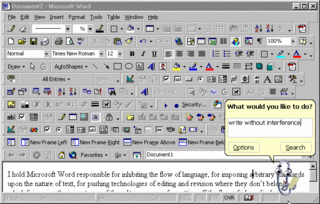I was just having a look at
Ruminating Dude who is trying to understand why senior high school kids can't rearrange a 3 variable equation with 2 knowns to find the answer. There are loads of these in chemistry:
- finding the density of something (or more commonly, if you know the density and know how many grams you want, what volume do you need)
- calculating the number of mols of something
- calc the concentration
- energy of a photon of light
to name just a few. In fact, it is a little surprising just how many 3 variable equations there are in science given that there could be any number, i am thinking of a half dozen more as i type this...
Anyway, teaching grad students (and a visiting academic from a country/institute that shall remain nameless) the intracacies of the perfect gas law is something that always does my head in. This is one of the most useful equations in chem and physics and relates pressure, temperature, number of gas molecules, temperature and a constant of proportionality in a simple little equation: PV = nRT.
This equation is so important, it is derived for you in any elementary physics class and was a key player in the 'all stuff is made up of other really small stuff called atoms' debate in the 19th century (18th?). So this equation has been bouncing around in their head for 4-5 years of tertiary education yet they are unable to re-arrange the equations to see the pressure change given a rise in temperature or the volume expansion needed to reduce the pressure by xyz etc. I am not going to try and convince you i am a maths genius, plenty of teachers and professors would eagerly convince you it's not my strong suit, but it is strange this education thing, that two students can go through the same system yet one of them, for all intents and purposes, is
functionally illiterate. And i can assure you, once you hit post-grad, no-one is going to hold your hand, tell you how wonderful you are and give you an A+ cause, well, you tried just so darn hard.
What's the point of this rant? I see these sorts of things as a symptom of 'future eating' to coin a term from Michael King (?) in his history of NZ. Rather than eating your food source, not telling students that they aren't keeping up is burning up a) your intellectual capital and b) destroying your credibility and c) being brutally unkind to the students themselves. It can take decades to build a reputation of quality but it can be destroyed in a fraction of the time if you take the student fees, pass everyone and to hell with the long term costs.
This is part of the problem with bums-on-seats funding for uni's. I have seen departments 'getting rid of the maths' for over a decade now so that undergrads wouldn't be frightened away. My physics class at Auckland Uni even renamed the thermodynamics section Thermal Physics, not cause it was different, they just thought the T-word might scare away the students.
What is really annoying as a chemist is that after years of ignoring maths because i could, finding out that it wasn't such a good idea and re-doing it after hours is that: the maths isn't that hard. Its hard mainly because it's taught by professional mathematicians who are trying to build little mathematicians. Once i was old enought to write in an exam 'don't know, don't care' and just do the bits i thought were interesting and useful, maths became a lot more fun and, most importantly, far less intimidating.
So i guess the point of this rant is: just because something is hard, doesn't mean you should ignore it (that goes for the student and the teachers/lecturers!) and conversely, if it is hard but it is important enough, you just have to do it anyway (and teachers/lecturers, fight for this a lot harder than you seem to be doing).


